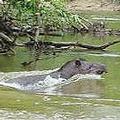 厄瓜多能源部長亞科斯塔(Alberto Acosta)表示,厄瓜多政府將用一年的時間等待,若厄瓜多政府不去開發厄瓜多境內亞馬遜流域中心的重要油田,國際社會是否將因此提出補償計劃。這一片繁盛且為重要雨林區的亞馬遜流域,蘊含了獨特且多樣的動植物。
厄瓜多能源部長亞科斯塔(Alberto Acosta)表示,厄瓜多政府將用一年的時間等待,若厄瓜多政府不去開發厄瓜多境內亞馬遜流域中心的重要油田,國際社會是否將因此提出補償計劃。這一片繁盛且為重要雨林區的亞馬遜流域,蘊含了獨特且多樣的動植物。
厄瓜多總統柯利亞(Rafael Correa)及其政府官員表示,若國際社會能夠補償其開發油田後所預期收益的半數,為了保護葉蘇尼國家公園(Yasuni National Park)生物多樣性與自願與世隔絕的原住民們,厄瓜多政府將不再打此國家公園裡油源的主意。
柯利亞最近在廣播的演講中提到,「不動用到油源是我們的第一選擇,但貧國如厄瓜多,所做出的犧牲之大,我們需要得到國際社會的補償。」柯利亞總統預估每年補償金額總數約3億5千萬美元。柯利亞補充,「厄瓜多不是在要求施捨,而是要求國際社會共同分擔這一份犧牲,且至少補償我國預期收益的半數,並且要求國際社會對於把油源留置於地底下對環境是有益處的這一點,有具體的共識。」
The government of Ecuador will wait up to one year to see if the international community offers to compensate the country for not developing a major oil field in the heart of the Ecuadorian Amazon, Energy Minister Alberto Acosta says. The area of lush, primary rainforest shelters a unique diversity of animals and plants.
Ecuadorian President Rafael Correa and his government say that if the international community can compensate the country with half of the forecasted lost revenues, Ecuador will leave the oil in Yasuni National Park undisturbed to protect the park's biodiversity and indigenous peoples living in voluntary isolation.
"The first option is to leave that oil in the ground, but the international community would have to compensate us for immense sacrifice that a poor country like Ecuador would have to make," said Correa in a recent radio address. President Correa estimates the compensation figure at around US$350 million per year. "Ecuador doesn't ask for charity," said Correa, "but does ask that the international community share in the sacrifice and compensates us with at least half of what our country would receive, in recognition of the environmental benefits that would be generated by keeping this oil underground."







